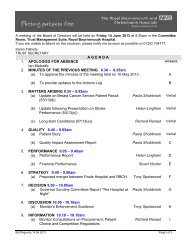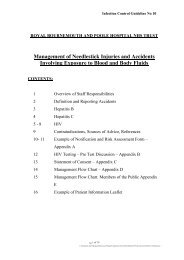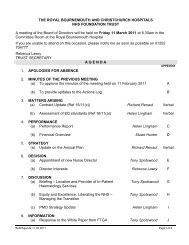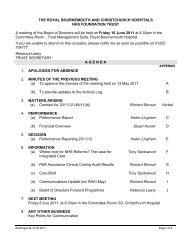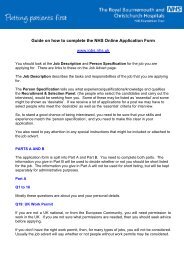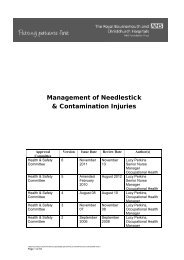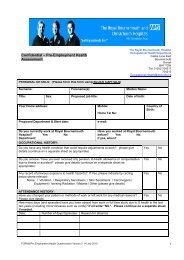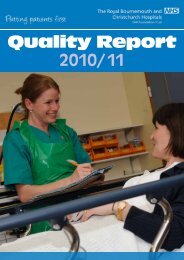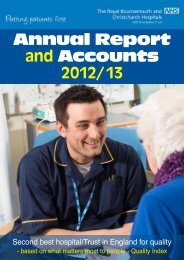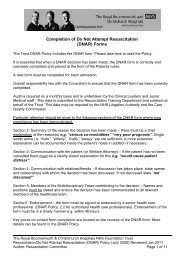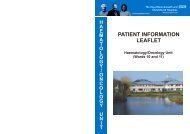The Royal Bournemouth and Christchurch Hospitals - Jigsaw Appeal
The Royal Bournemouth and Christchurch Hospitals - Jigsaw Appeal
The Royal Bournemouth and Christchurch Hospitals - Jigsaw Appeal
You also want an ePaper? Increase the reach of your titles
YUMPU automatically turns print PDFs into web optimized ePapers that Google loves.
<strong>The</strong> <strong>Royal</strong> <strong>Bournemouth</strong> <strong>and</strong><br />
<strong>Christchurch</strong> <strong>Hospitals</strong><br />
NHS Foundation Trust<br />
Patient information: High dose Melphalan <strong>and</strong><br />
Autologous Stem Cell Transplant<br />
This treatment is usually for patients who have multiple myeloma. As it is an intensive<br />
regimen, we will assess your kidneys <strong>and</strong> liver prior to the transplant with blood <strong>and</strong><br />
urine tests. We will also assess your heart with a special scan (echocardiogram) <strong>and</strong> your<br />
lung function with breathing tests. All these tests will be carried out on an outpatient<br />
basis. As you will receive intravenous chemotherapy, blood products <strong>and</strong> fluid for the<br />
procedure <strong>and</strong> because you will need blood tests on a daily basis, we will ask the<br />
radiologists to insert a Hickman line prior to the transplant.<br />
You will be admitted for the transplant into an isolation room (with filtered air) but<br />
visitors will be allowed to see you throughout the procedure. We discourage people<br />
visiting who have symptoms of viral or bacterial illnesses. We would also limit visitors to<br />
relatives or close friends with no more than 2 people visiting at one time.<br />
For the first two days, we will give you large amount of intravenous fluid, to aid<br />
excretion of the melphalan by the kidneys. We may also use diuretics to maintain an<br />
adequate urine output. On the second day, you will receive the Melphalan by intravenous<br />
infusion <strong>and</strong> on the third day we will re-infuse your stem cells, which have been<br />
harvested prior to your admission for the transplant. Traditionally the day we give you<br />
your stem cells back is called day 0. It will then take 2 to 3 weeks for your bone marrow<br />
to recover from the treatment <strong>and</strong> you will have to stay in hospital for that period of time.<br />
<strong>The</strong> total inpatient stay is usually 4 weeks, but some patients require a longer stay.<br />
<strong>The</strong> regime of IV fluid, Melphalan <strong>and</strong> stem cells re-infusion is as follows:<br />
IV fluids: start on day-2 (day of admission)<br />
Melphalan: on day –1<br />
Stem cells: on day 0<br />
Day-2 Day-1 Day 0<br />
[_________________[___________________[____<br />
Admission Melphalan Stem cells<br />
IV fluid<br />
Melphalan can cause nausea <strong>and</strong> vomiting. We will give you a combination of antisickness<br />
medications in the form of injections <strong>and</strong> tablets.
<strong>The</strong> stem cells will be given to you by a doctor or a nurse. It is exactly like a blood<br />
transfusion: the stem cells are thawed <strong>and</strong> re-infused through the Hickman line. <strong>The</strong><br />
number of bags will vary from one patient to the other. <strong>The</strong> stem cells are suspended in a<br />
solution of DMSO. This smells <strong>and</strong> tastes like sweet corn <strong>and</strong> your breath may smell for<br />
2 to 3 days after the re-infusion of the cells. <strong>The</strong> infusion can sometimes cause an allergic<br />
reaction <strong>and</strong> we will pre-medicate you prior to giving you the stem cells. It is not unusual<br />
to have pink urine after the stem cell infusion.<br />
Immediate side-effects:<br />
Infections:<br />
<strong>The</strong> chemotherapy will cause immuno-suppression <strong>and</strong> low blood counts (especially<br />
neutrophils). This increases the risk of serious infection whilst your blood counts are very<br />
low. We will try to prevent this by giving you a prophylactic combination of:<br />
Antibiotic: ciprofloxacin<br />
Antiviral: aciclovir<br />
Antifungal: itraconazole<br />
We cannot guarantee that this will work 100% <strong>and</strong> if you do get a temperature when your<br />
neutrophils are low (below 1.0), we will treat this promptly with injections of antibiotics<br />
rather than tablets. Occasionally patients can have severe infections, which are lifethreatening.<br />
If this occurs, sometimes we have to monitor you on the intensive care unit<br />
until you are better.<br />
Blood products:<br />
Due to bone marrow suppression, you will become anaemic <strong>and</strong> thrombocytopaenic (low<br />
platelet count which increases the risk of bleeding). We will give you blood transfusions<br />
<strong>and</strong> platelet transfusions as required until your bone marrow recovers. You will require<br />
irradiated blood products for life <strong>and</strong> we will give you an information card concerning<br />
this.<br />
Gastro-intestinal side-effects:<br />
Melphalan will affect the lining of your throat, stomach <strong>and</strong> bowel. This will tend to<br />
reduce your appetite <strong>and</strong> may give you diarrhoea. This can last about a week <strong>and</strong> will be<br />
treated with intravenous fluids <strong>and</strong> tablets. Virtually all patients will suffer with a severe<br />
sore throat (mucositis). Swallowing can be difficult but is usually short-lived. We will<br />
give you strong pain-killers to alleviate this.<br />
Hair loss:<br />
<strong>The</strong> chemotherapy will make you lose your hair. This is temporary <strong>and</strong> we will discuss<br />
with you strategies to cope with this.<br />
Mortality:<br />
<strong>The</strong> transplant procedure carries a mortality risk, usually from overwhelming infection or<br />
bleeding. In our unit this risk is less then 5%.
Long term side effects:<br />
Immunosuppression:<br />
Even after your bone marrow recovers <strong>and</strong> your neutrophils are back to a normal level,<br />
your immunity will be low for a few months. During that period you will be seen<br />
regularly as an outpatient <strong>and</strong> you will need to be treated promptly if you develop a<br />
temperature. We will also continue the antibiotic prophylaxis <strong>and</strong> we will give you<br />
treatment via tablets or nebulisers against an infection called Pneumocystis Carnii<br />
Pneumonia (PCP). This will usually be discontinued after a period of 6 months. We also<br />
recommend that you undergo a program of re-vaccination after one year, as the immune<br />
system may have “forgotten” some of the vaccinations you received prior to the<br />
transplantation.<br />
Fertility:<br />
High dose Melphalan often causes infertility, although some patients can regain some<br />
fertility. Often patients have received prior chemotherapy <strong>and</strong> will have discussed fertility<br />
with their doctor. However, you may want to discuss this further prior to the transplant.<br />
For men we can offer sperm storage. Options are more limited in women, so please ask if<br />
you would like to persue this further.<br />
Secondary cancer <strong>and</strong> leukaemia:<br />
You should be aware that there is a very small risk that the chemotherapy can cause<br />
secondary leukaemia <strong>and</strong> cancer at a later date. We will be happy to discuss this with you<br />
further if you wish.



